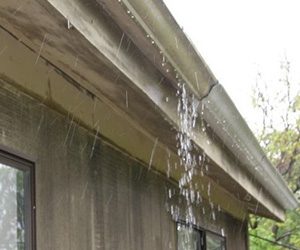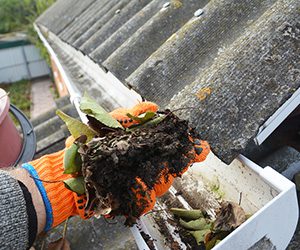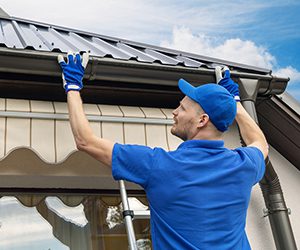Updated June 11, 2025

Gutters aren’t given much thought until it rains. When a heavy rainfall starts and water is spilling over the edge of your roof, pummeling the rose bushes below and pooling at the foundation, that’s when most homeowners begin thinking about installing gutters.
Before taking the next step, let’s dive in and take an in-depth look at what a gutter system is, why it’s important, and what to consider when choosing the right gutters for your home.
The Importance of Gutters
Gutters work as a drainage system along your roofline to collect and channel rainwater through downspouts, safely away from your home’s foundation. With just a few inches of rain, properly installed rain gutters can easily move several thousand gallons of water away from your home, preventing mold, mildew, and costly structural damage.
Choosing the Right Gutters
Deciding on the right gutters for your home can be a big choice thanks to the many types of gutter materials to choose from. Whether it’s aluminum gutters, steel gutters, or even copper gutters, there is a material for every preference and budget, as well as different style gutters for every aesthetic.
At B&M Insulation, as experts in our field, we recommend seamless 5”-6” aluminum gutters for local homeowners because they are an effective, long-lasting choice that are lightweight, rust-resistant, affordable, and weatherproof. Our expert team will evaluate your home and work with you to determine the right style and color of gutters that best suit your home.
Why Gutters Are Worth It
A solid gutter system offers several long-term benefits:
Protect your home and foundation
Gutters divert water to prevent erosion and water damage, including cracks, destabilization, and moisture penetration.
Prevent roof and fascia damage
Rain gutters stop water from pooling on flat portions of your roof, getting backed up under shingles, or saturating your fascia boards which can lead to rot.
Preserve exterior walls
Gutters prevent water staining and deterioration of siding or brick, reduce the risk of mold and mildew on your exterior walls, and keep water from getting behind siding materials.
Reduce erosion and protect landscaping
The installation of gutters channels runoff in a controlled way to prevent soil erosion, protect your grass, flowers, and shrubs from damage, and help maintain stable ground around your foundation. Enjoy even more benefits when you combine your gutters with an eco-friendly rain garden.
The Downside of Gutters
Gutters also come with some extra responsibilities and things to consider too:
Clogging and cleaning issues
Cleaning your gutters is essential. Letting leaves, twigs, and debris pile up can clog your gutters and lead to water backup, spillover, and damage, and even mosquitoes in freestanding water. Gutter guards are a great way to prevent these issues, with an addition to the upfront cost.
Need for regular maintenance
Regular maintenance of your gutters includes twice-a-year cleanings (typically fall and spring) and regular inspections to look for loose or detached sections, leaks, and damage. You can handle the maintenance yourself or pay for professional services.
Possible ice dams in winter
With our up and down winter weather here in Tennessee, it’s easy for melted snow to continuously refreeze at your roof’s cold eaves and form ice dams. These ice dams can potentially damage your gutters and your roof by blocking drainage and forcing water under your shingles. Maintaining proper roof and attic insulation and ventilation can help prevent these issues.
Installation and repair costs
While gutters are a smart investment with many long-term benefits, the upfront costs can still be significant. Depending on the type of gutter, material, and size of your home, installation prices can range widely. Thankfully, building permits are often not required in most areas of Tennessee, like Nashville.
What to Consider Before Installing Gutters
As you make plans to install gutters on your home, consider these factors:
Tennessee climate and weather patterns
Tennessee sees about 50 inches of rain a year, so consider installing 6” gutters for 40% more capacity than 5’ gutters to better handle the rainfall and changing weather conditions. And be sure that your gutters are fastened securely for effective storm and wind resistance.
Type of roofing material
Aluminum gutters are a great fit for every roof type, but it’s important to consider how the material of your roof affects the effectiveness of your gutters. Asphalt shingles shed granules that require regular cleaning, metal roofs need larger gutters thanks to their faster water runoff, and wood or tile roofs contribute debris. Even your roof pitch can affect the water flow rate and gutter requirements. Be sure to verify your roof and fascia condition before installation.
House location and surrounding landscape
Be strategic in how and where your downspouts are placed. Evaluate current water flow patterns around your property, taking your trees, driveway location, and soil type into account. Adapt your gutter system to your property’s unique characteristics and consider helpful options like downspout extenders, rain barrels, and drainage pipes if needed.
Personal preferences and budget
Don’t forget to balance your practical needs with your aesthetic preferences and your budget. If you’re on a limited budget, prioritize crucial areas first and determine whether you intend for DIY maintenance or plan on hiring a professional. Choose what works best for your needs and your wallet.
Gutter Maintenance Tips
When it comes to keeping your gutters in shape, stick to a schedule. Use a scoop, hose, pressure washer, or shop vacuum to clean them and trim overhanging branches to reduce debris. Invest in gutter guards to reduce maintenance needs. And don’t forget to inspect them regularly, in spring and fall, for debris buildup, loose or sagging sections, cracks, rust, and holes, and leaking joints or seams. Try watching your gutters during a rainstorm to catch any issues.
Remember, addressing small problems quickly will prevent larger ones down the road.
New Considerations for Tennessee Homeowners in 2025
Because Middle Tennessee is experiencing an increasing frequency of intense rainfall events, it’s important to be prepared for the changing weather with quality, secure gutters. Be aware of local regulations and HOA rules that may apply for gutters and be sure to take advantage of stormwater programs and incentives available in your area. Consider adding a rain barrel to your yard to help reduce runoff and conserve more water and receive valuable landscaping guidance through the Tennessee Smart Yards program.
Make an Informed Decision About Gutters for Your Tennessee Home
As a Tennessee homeowner, it’s important to make an informed decision about gutters for your home. A good gutter system can make a significant impact on the structure and maintenance of your home, ensuring the longevity of your home’s foundation and exterior. At B&M Insulation, we have been installing quality rain gutter systems in our Murfreesboro community and beyond since 1976. Our expert team is here to answer your questions. Contact us today to learn more about the right gutter system for your Tennessee home.


